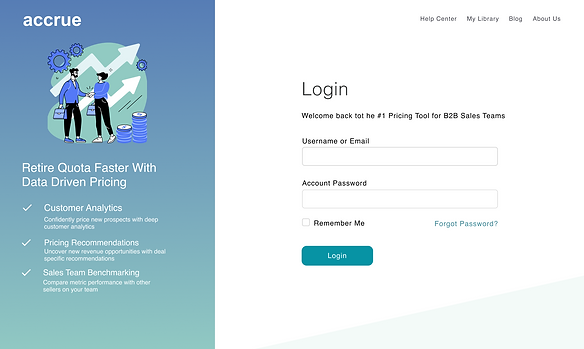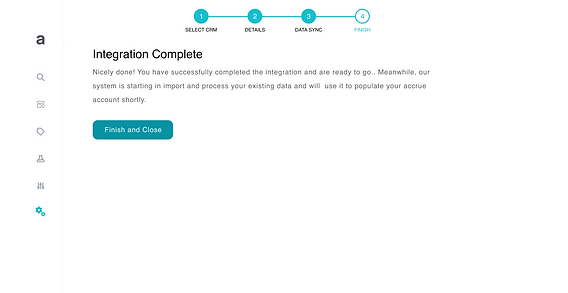High Fidelity Prototype of Successful User Flow
OVERVIEW
Accrue’s platform for B2B sales teams aspires to retire quota faster with data driven pricing. This entails three core benefits to its users:
-
Confidently price new prospects with deep customer analytics
-
Uncover new revenue opportunities with deal-specific recommendations
-
Compare metric performance with other sellers on the team
Accrue’s unique value proposition (UVP) depends on the system’s ability to analyze a user’s current and potential customers & opportunities, past sales stats, market factors and internal price functions to scientifically calculate price recommendations and which in turn form the basis for a quantitative comparison of sales performance.
In order to do so, the system requires data inputs identifying:
-
sales leads (status, lead name, created date, etc.)
-
opportunities (name, account name, deal volume, etc.)
as well as inputs into price modelling and customer analytics for these identified sales prospects such as:
-
market data (competitors, market price, etc.)
-
vendor data (assets, stocks, price lists, etc.)
-
customer data (deal history, customer characteristics, etc.)
Furthermore, to successfully provide relevant analytics and recommendations to its users, it is essential for accrue to receive updates to this data in near real-time.
Since the user is highly likely to already have this data entered into and stored in a customer relationship management (CRM) system, it appears most efficient to import this data from the user’s CRM rather than requesting a time and cost-intensive, duplicate manual entry of this information, i.e. outbound data integration where accrue makes calls to a user CRM’s REST API to receive information from the the application or create/update records.
Example of relevant CRM data integration and application
.jpg)
For this outbound data integration and application to be possible, a new user (Admin member) needs to provide specific inputs such as the type of supported CRM and account access details, review and agree to the frequency and scope of data access, handling, storage, and processing by accrue (“Concierge”). Following the one-time onboarding process, it is then possible to run an automated data integration process that continuously synchronizes user CRM data to the accrue database in predefined intervals so that the system’s analytics and recommendations are based on up-to-date data. (see Notes as end of document for a review of multiple options for data integration with pros and cons)
Big Picture: “Concierge” Process and Outbound Data Integration in accrue Architecture
.jpg)
GOAL
Create a simple, fast, secure and seamless user data onboarding experience for Admin users of new (i.e. not yet CRM data integrated) accrue accounts. User provides essential information for accrue to connect to their CRM account, access and export relevant data.
Success Metrics
-
Integration setup completes in under 5 minutes - automatic measurement could be implemented by accrue Devs
-
User finds onboarding process easy and completes process completely by themselves (e.g. consulting Google) - user survey could survey ease of data onboarding process (Not at all Satisfied, Slightly Satisfied, Neutral, Very Satisfied, Extremely Satisfied), consider metric met if more than 70% of users are “Very Satisfied” or “Extremely Satisfied” and did not consult external resources
-
After onboarding process, accrue identifies sales opportunities and calculates price recommendations within X? hours
Assumptions & Dependencies
-
Each account has only one supported CRM
-
User’s CRM is supported by accrue
-
User security requirements allow accrue direct integration with their CRM
Requirements
PERFORMANCE
P1 Integration setup completes in under 5 minutes (from the moment the user click “Start Now” (Concierge Welcome page) to the moment the user clicks “Finish and Close” (Integration Complete page)
FUNCTIONAL
F1 Accrue must support the list of supported CRMs (3 most popular CRMS: Salesforce Sales Cloud, Oracle NetSuite CRM+, C2CRM; ideally: should analyze top 3 CRMs among potential first users)
F2 For continuous synching, there should be no data duplication
F3 For continuous synching, modifications of historical data already existing in the accrue database should be handled properly
F4 Syncs failing in the middle of the process must be completed through further sync attempts without data duplication or loss of data
F5 Accrue analytics and price recommendations must be recalculated, if relevant historical data was modified
SECURITY
S1 Accrue must store credentials user provides on Provide Details page securely
USER INTERFACE
U1 New users must see concierge popup upon login (first login or any further login as long as integration setup is incomplete)
U2 On Review Data Import page, user must be able to review complete list of integrated data as well as determine data setting for optional data imports
U3 User must agree to provided accrue Terms and Policies to complete integration setup U4 User must be able to press “Save and Continue Later” to save current state of Concierge
U5 Upon next login, user is navigated to last saved Concierge page if they did not complete it during the past session, saved their progress and click to continue
U6 If user clicks to close page during Concierge setup, user is provided with a popup message asking to save progress otherwise data will be lost
Critical User Journeys
NEW USER Workflow
RETURNING NEW USER with previously deferred Concierge
RETURNING NEW USER with saved Concierge progress
-
-
User opens the product for the first time and is presented with the CRM Concierge popup
-
User decides whether to start setup process or defer to a later date
-
If user starts setup, they are able to complete process or save progress and continue at a later date
-
User opens the product and is presented with the CRM Concierge popup
-
User decides whether to start setup process or defer to a later date
-
If user starts setup, they are able to complete process or save progress and continue at a later date
-
User opens the product after having previously partially completed and saved the CRM Concierge process and is presented with pop-up suggestion to complete setup
-
If user agrees to continue, they are presented with the Concierge page where they had previously left of, with previously entered data filled in
-
User continues setup process until completion or saving to continue later
-
Task Flow
.jpg)
Wireflow

Accrue Quick Base Design System

High-Fidelity Mockups
Login Page (assumed to pre-exist)

Home Screen (assumed to pre-exist)

Concierge 0: Slide-In & Welcome

Concierge 1: Select CRM

Concierge 2: Provide Details

Concierge 4: Integration Complete

Out of Scope
Integration Settings Modifications - after completion of CRM Concierge, the user should be able to access, review and edit integration settings through an icon in the main menu (considered for later versions)
More than one CRM integration (considered for later versions)
Other Integrations - How the outlined process can be altered in the future to also allow integration with ERMs and other data sources, bi-directional integration
Alternative onboarding process for CRM systems that do not support direct integration or different user with different data needs
Notes
OPTIONS FOR DATA INTEGRATION
UI-based Native Integration
Pros:
-
Allows for a smooth setup experience
-
Easy to automate integration process to achieve near real-time synchronization
-
No technical skills required by person setting up
Cons:
-
Requires intended CRM systems to support direct integration with their system (based on my research, the top 10 CRMs do support this, however, I am not sure whether smaller CRMs would have to be integrated and whether they would support this)
-
Highly problematic with large user accounts such as Google which might not be willing to provide accrue with full, unlimited access to their CRM data and who want to run export on their server
-
Difficult for user company to limit accrue’s access to only needed CRM data Based on the differences of CRM architecture and data structure, we would have to develop a customized solution (script) for each supported CRM
3rd Party Integration Service (e.g. Fivetran, Boomi; also support other major data sources)
-
Same as above
Pros:
-
Service provider is responsible for maintenance
-
Major CRMs already supported
Cons:
-
Large companies might not want a 3rd party to access their CRM data
-
Limited to top-10 CRM systems
Provide Script to User, user runs on their server
Pros:
-
User does not provide accrue with direct access to their account
-
Data export is limited to only required data
Cons:
-
Requires technical skills on user side, most marketing teams could not independently set it up
-
However: accrue could offer a service to have it set up for the customer
EXAMPLES OF DIRECT INTEGRATIONS
-
PandaDoc integration with Microsoft Dynamics, HubSpot, Zoho CRM
-
Boomi integration with Salesforce
REVIEW OF TOP CRM SYSTEMS
-
Report on top 40 CRM systems in 2021
USER VOICES ON INTEGRATION
REMAINING PM QUESTIONS
-
Ideally, I would love to analyze which CRMS are mainly used by different potential users and whether they utilize more than one CRM
-
Would like to adjust design to updates input needs depending on data integration path chosen by accrue Devs
-
Also, I would like to better study the target user, their security requirements, ability to
-
Not yet fully clear on what user inputs (Details) are required for integration and whether these vary between
-
I would love to run user testing on clickable prototype to ensure process in intuitive and effective
![Natalia Tishina no tagline signature transparent background [Converted].png](https://static.wixstatic.com/media/e60266_6eb404d3d8ba4e798f3c3c0077a7bb29~mv2.png/v1/fill/w_145,h_63,al_c,q_85,usm_0.66_1.00_0.01,enc_avif,quality_auto/Natalia%20Tishina%20no%20tagline%20signature%20transparent%20background%20%5BConverted%5D.png)